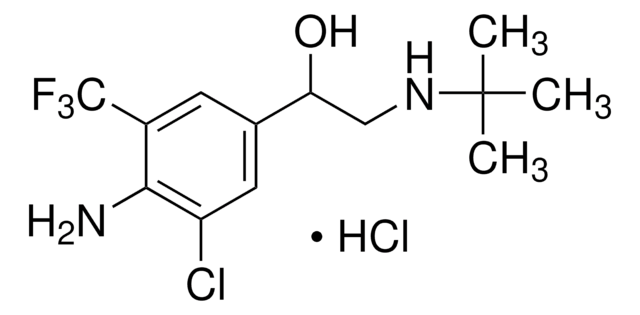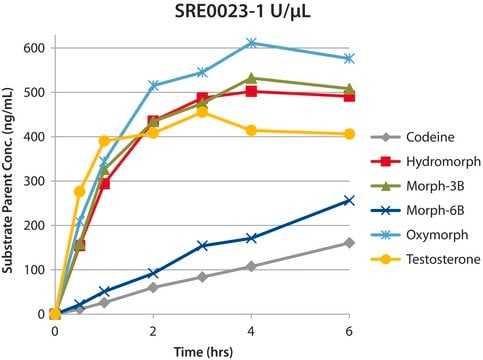G7770
β-Glucuronidase from Helix pomatia
Type HP-2S, aqueous solution, ≥90,000 units/mL
Synonym(s):
β-D-Glucuronide glucuronosohydrolase
Sign Into View Organizational & Contract Pricing
All Photos(3)
About This Item
CAS Number:
MDL number:
UNSPSC Code:
12352204
NACRES:
NA.54
Recommended Products
sterility
sterile-filtered
Quality Level
type
Type HP-2S
form
aqueous solution
specific activity
≥90,000 units/mL
secondary activity
≤7,500 units/mL sulfatase
storage temp.
2-8°C
Looking for similar products? Visit Product Comparison Guide
General description
β-Glucuronidase Type H-2 from Helix pomatia is a crude solution of enzymes derived from the Roman snail. Many β-glucuronidases derived from mollusks also contain sulfatase activity.
Application
β-Glucuronidase from Helix pomatia has been used:
- in the treatment of heparinized plasma sample for the hydrolysis of glucuronic acid-conjugated metabolites
- in the pre-treatment of plasma sample for the determination of 1′-hydroxymidazolam (1′-OHMDZ)
- for the treatment of bile samples from rainbow trouts for the hydrolysis of glucuronate and sulfate metabolites
- in treating the cells from the sporulation media for the complete digestion of the cell walls of asci
β-glucuronidase was used in enzymic hydrolysis of tissue homogenates for liquid chromatography-electrospray ion trap mass spectrometry (LC/MSn) analysis, to study the structures of degradation products of baicalin. It is used as a reporter gene in GUS assays to monitor gene expression.
New Technical Article Comparing Performance of Different Enzymes
Learn more
about recent application data generated by Sigma R&D to optimize hydrolysis for different drug classes using enzymes from different sources and the use of a chromatographicaly purified enzyme to reduce the effect of esterase activity resulting in conversion of 6-MAM to Morphine
Learn more
about recent application data generated by Sigma R&D to optimize hydrolysis for different drug classes using enzymes from different sources and the use of a chromatographicaly purified enzyme to reduce the effect of esterase activity resulting in conversion of 6-MAM to Morphine
Biochem/physiol Actions
β-glucuronidase (β-GIc) is an exoglycosidase that catalyzes the breakdown of complex carbohydrates. In humans it converts conjugated bilirubin into the unconjugated form, making bilirubin suitable for reabsorption.
Used for the hydrolysis of glucuronide conjugates in urinary metabolite analysis
Quality
Many β-glucuronidases derived from mollusks also contain sulfatase activity.
Unit Definition
One Sigma or modified Fishman unit will liberate 1.0 μg of phenolphthalein from phenolphthalein glucuronide per hr at 37 °C at pH 5.0 (30 min assay).
Sulfatase Unit Definition: One unit of sulfatase will hydrolyze 1.0 μmole p-nitrocatechol sulfate per hr at pH 5.0 at 37 °C.
Physical form
Aqueous solution in ~1.0 M ammonium sulfate with 3 mM sodium azide as preservative.
Signal Word
Danger
Hazard Statements
Precautionary Statements
Hazard Classifications
Resp. Sens. 1 - Skin Sens. 1
Storage Class Code
10 - Combustible liquids
WGK
WGK 3
Certificates of Analysis (COA)
Search for Certificates of Analysis (COA) by entering the products Lot/Batch Number. Lot and Batch Numbers can be found on a product’s label following the words ‘Lot’ or ‘Batch’.
Already Own This Product?
Find documentation for the products that you have recently purchased in the Document Library.
Customers Also Viewed
Food Biotechnology, 93(9) (2000)
Identification and dose dependency of ibuprofen biliary metabolites in rainbow trout
Brozinski JM, et al.
Chemosphere, 93(9), 1789-1795 (2013)
Determination of trimipramine and its demethylated and hydroxylated metabolites in plasma by gas chromatography?mass spectrometry
Eap CB, et al.
Journal of Chromatography. B, Biomedical Sciences and Applications, 652(1), 97-103 (1994)
Pharmacokinetics of intravenous and oral midazolam in plasma and saliva in humans: usefulness of saliva as matrix for CYP3A phenotyping
Link B, et al.
British Journal of Clinical Pharmacology, 66(4), 473-484 (2008)
Ian M Ehrenreich et al.
Nature, 464(7291), 1039-1042 (2010-04-16)
Most heritable traits, including many human diseases, are caused by multiple loci. Studies in both humans and model organisms, such as yeast, have failed to detect a large fraction of the loci that underlie such complex traits. A lack of
Our team of scientists has experience in all areas of research including Life Science, Material Science, Chemical Synthesis, Chromatography, Analytical and many others.
Contact Technical Service











